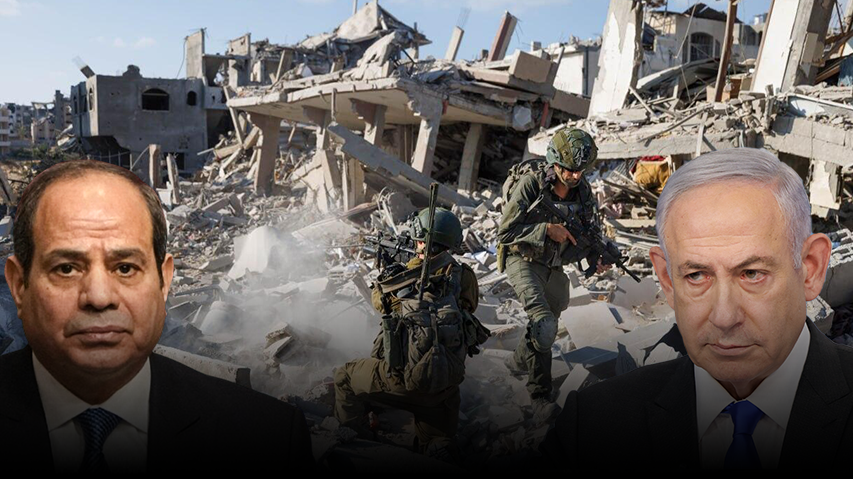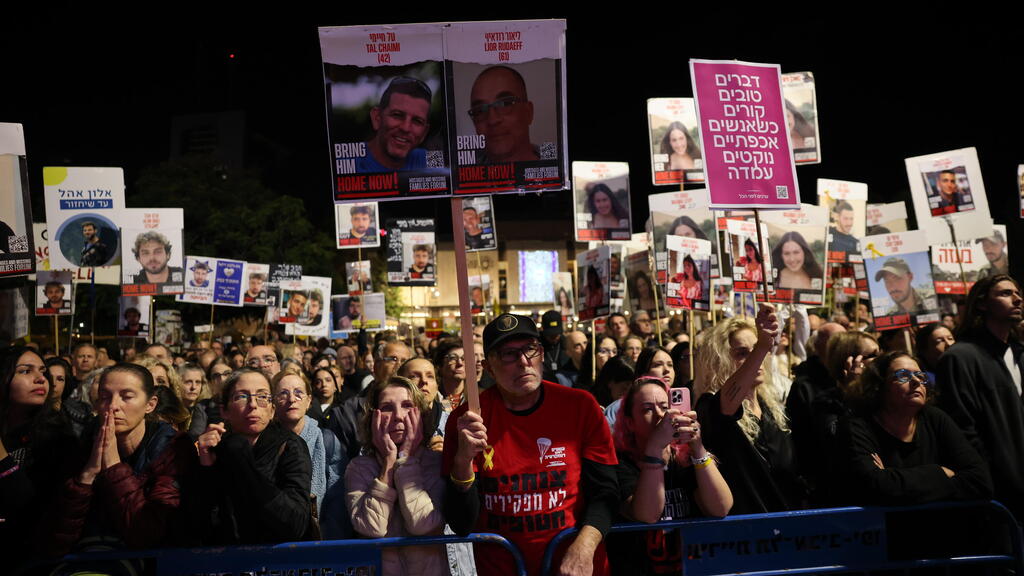Getting your Trinity Audio player ready...
After a senior Israeli official said on Monday that it would be possible to reach a hostage deal "within a week or two ," a senior Egyptian official also told Ynet and Yedioth Ahronoth on Tuesday that the announcement of an agreement that would lead to a cease-fire and a hostage deal is "very close."
A Hamas delegation led by senior Hamas official Khalil al-Hayya left Cairo on Sunday night, following discussions with Egyptian intelligence chief Major General Hassan Mahmoud Rashad and his team. It was learned yesterday that the delegation had handed over to the Egyptians a detailed list of Israeli hostages - including the sick and elderly, women and men - that Hamas proposes to release in the first phase. The Hamas delegation also handed over a detailed list of Palestinian prisoners in Israeli prisons that Hamas demands to be released as part of the new deal.
2 View gallery


Prime Minister Benjamin Netanyahu, Egyptian President Abdel Fattah al-Sisi, Gaza Strip
(Photos: IDF Spokesperson, Mark Israel Sellem, AP)
The Egyptian official clarified that an Israeli delegation is scheduled to leave for Cairo this week for a meeting at the intelligence headquarters, during which they will be given the lists of hostages and Palestinian prisoners. Hamas made it clear to Egypt that "there is a better chance than ever before of closing a deal," in exchange for the release of the prisoners and Israel's withdrawal from the Philadelphi corridor and other areas in the Gaza Strip.
The Al-Araby channel and the Al-Jazeera network in Qatar reported that, in talks in the Egyptian intelligence offices, an understanding was reached between Egypt and Hamas regarding the places from which the IDF will withdraw in Gaza, and that a week after the withdrawal, a cease-fire will be declared and the round of releasing Israeli hostages and Palestinian prisoners will begin. Israel, the Egyptian source clarified, will first withdraw from Rafah and areas to be determined in advance along the Philadelphi Corridor.
Meanwhile, Qatar's Foreign Ministry spokesman Majed Al-Ansari commented on the progress in the negotiations, saying that his country had renewed contacts with Hamas and Israel "in good faith" as part of the mediation toward a cease-fire in Gaza. "We are open to any path that leads to an agreement, we have not given up on mediation," he said. "Negotiations are continuing and it is too early to talk about developments."
On Monday, an Israeli senior official estimated in an interview with Ynet that "within a week or two" it would be possible to reach a hostage deal, and said that "the conditions are ripe." At the same time, sources close to a senior Hamas official said Monday that there had been significant progress in talks for a deal. According to the same sources, the terrorist organization agreed to a gradual cessation of the war, and to a deal that is divided into three stages and includes a gradual withdrawal.
According to the proposed deal, they said, between the sixth and eighth weeks of the cease-fire, IDF forces will withdraw from the Rafah Crossing and from city centers, after which negotiations will begin for a permanent cease-fire and the release of the kidnapped soldiers.
Hamas, the insiders claimed, has handed Egypt a list of the living Israeli hostages - and is waiting for Israeli agreements regarding the list of Palestinian prisoners it requested, which also includes high-security prisoners
60 'trial days', Presence in Gaza during the cease-fire
An Egyptian official explained last week to Ynet and Yedioth Ahronoth that the new proposal put forward by Cairo includes a gradual cessation of fighting in Gaza, with the Israeli side withdrawing from the Rafah Crossing, in parallel with the declaration of a temporary cease-fire for about 60 days. He emphasized that the first 60 days would be designated as "trial days" for both sides - Israel and Hamas - and that, if the plan holds up, it would be "the end of the conflict between the sides."
Get the Ynetnews app on your smartphone: Google Play: https://bit.ly/4eJ37pE | Apple App Store: https://bit.ly/3ZL7iNv
About a week after the temporary cease-fire comes into effect, according to the Egyptian official, the process of returning surviving Israeli hostages will begin. At the same time, hundreds of Palestinian terrorists also will be released from Israeli prisons, according to terms to be agreed upon between the parties. During the 60-day trial cease-fire, Israel will maintain a military presence in Gaza. The proposal also addresses the possibility of Palestinian refugees returning to the northern Gaza Strip, as Hamas demands.
As for the Rafah Crossing, according to the plan it is expected to be transferred to the management and supervision of the Palestinian Authority. In previous contacts, Israel raised the possibility of maintaining a certain surveillance capability through cameras at the Rafah Crossing. In addition, according to the senior Egyptian source, a joint management committee from the West Bank and the Gaza Strip will be established, which will include between 10 and 15 "independent Palestinian political technocrats." The committee will be supervised by American representatives.



